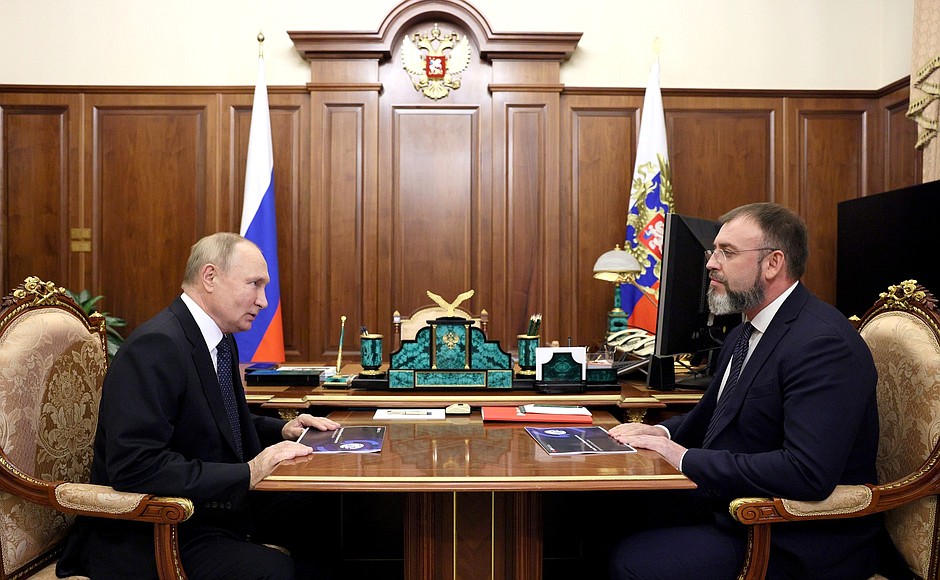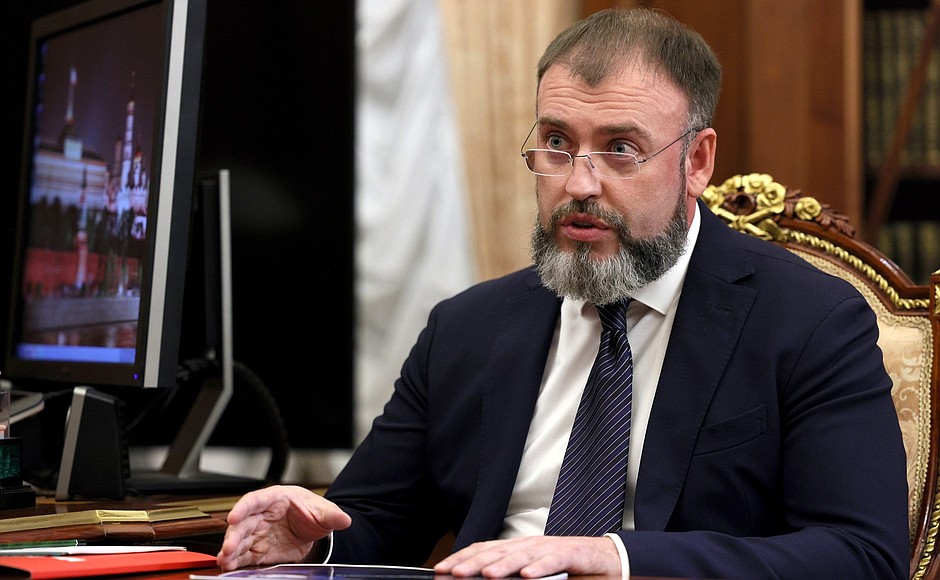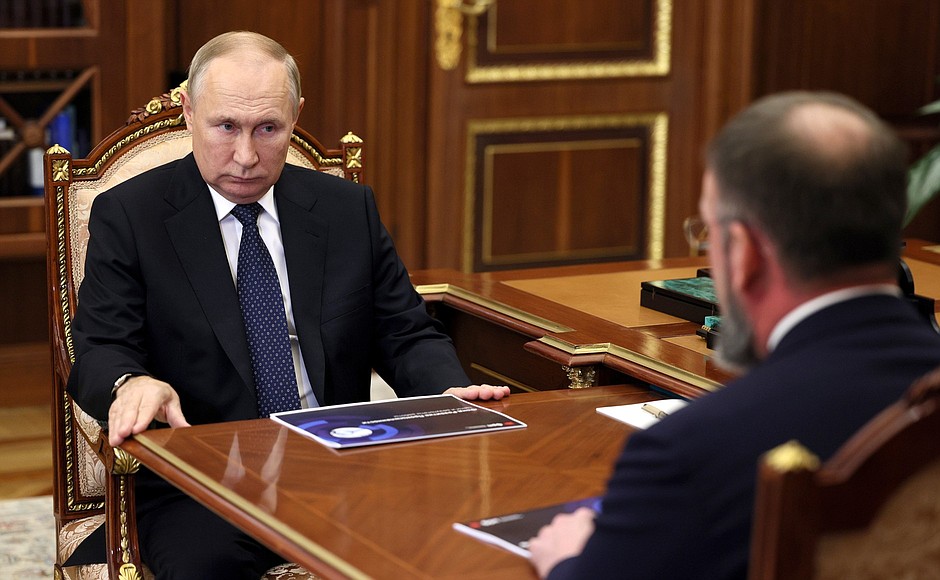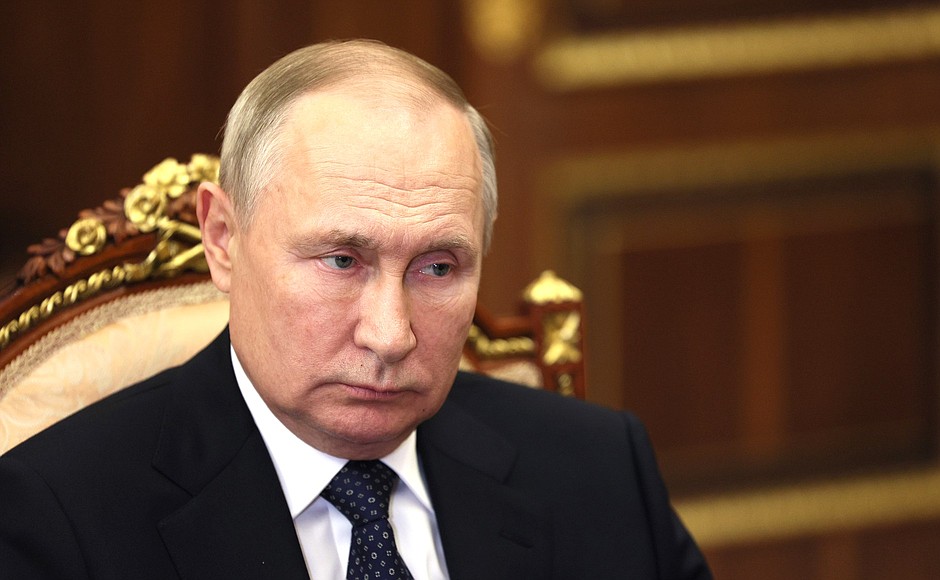President of Russia Vladimir Putin: Good afternoon.
Mr Petrutsa, the Industrial Development Fund was established in 2014.
Director of the Industrial Development Fund Roman Petrutsa: Yes.
Vladimir Putin: The terms for supporting businesses are really good – one, three, five percent interest for up to 10 years and a sum from 5 million to 5 billion. This is a good programme on the whole.
As far as I understand, the results are also worth discussing. You can use these results to report on all these years. Let’s talk about that.
Go ahead, please.
Roman Petrutsa: Mr President, thank you very much for this opportunity to tell you first-hand about the Fund.
Indeed, the Industrial Development Fund provides Russian industrial companies, the real economy, with loans on unique terms – one, three and, under one programme, five percent interest for the longest possible periods – five, seven and ten years.
And you are right – there are hundreds of projects every year. This year alone, we are confidently moving to the figure of 250 loans worth over 100 billion rubles – this is an enormous sum for us. During the Fund’s operation, we have already financed almost 1,200 projects in 74 regions of the country.
I believe a key factor behind the high demand for the Fund’s support measures is that they fully meet the industry’s need for long and cheap money for development.
Indeed, this Fund was established in late 2014, at the initiative of the Ministry of Industry and Trade. Since then, the number of applications to the Fund has only been growing. This year it actually doubled compared to last year.
I believe the following key factors make our product especially attractive. The interest rate – 1–3 percent per annum – is really low, but it is not that important per se. True, it saves the company money, but the good thing is that it creates a significant margin of safety in each project’s business plan. Next, it is a fixed interest rate, meaning it remains unchanged for the entire period the Fund finances the project. This makes the project far less sensitive to the macroeconomic fluctuations that we are currently observing.
Furthermore, the Fund has a fundamental rule: we give each company repayment holidays for the first three years, giving it time to build a production facility and purchase equipment. They do not begin to repay the principal until they go into serial production. In our experience, three years is more than enough to start even a complex manufacturing business.
Such parameters make our product attractive not only to the enterprises themselves, but more and more often, I see commercial banks as their partners in the projects. A commercial bank may provide additional funding or security for the borrower’s repayment of budget funds. Here, in addition to high-quality security, the borrower can benefit from having a partner who can lend a hand in case of difficulties: provide working capital or additional investment if the cost of the project increases. In such cases, the Fund fulfils its mission at the start of the project, giving an impetus and acting as a kind of catalyst for the business’s decision to take this step in its development.
All this taken together ensures very high quality in the Fund's portfolio. To date, out of more than 1,000 projects we have funded, less than 3 percent have ended up facing claims from the Fund. In other words, the funding provided to us – as of today it is 200 billion rubles of government money – has been preserved and even increased a little by the interest the businesses have been paying. Low as it is, it now brings in 2 billion a year.
Vladimir Putin: I know. This is why both the Ministry of Finance and the Central Bank praise your work highly.
Roman Petrutsa: Allow me to cite one more figure. We expect that next year, in 2023, the total amount of tax paid by the projects financed with our support will exceed the amount the government had allocated to the Fund. Again, that amount has been preserved and is working for the benefit of Russian industry.
The Fund is ready for new challenges in financing and supporting projects of national significance. In saying this, I am relying on the already vast experience, the competences of the Fund’s team, professionalism and real results.
I will give one more figure: 850 companies have become our clients over these years. New manufacturing companies approach us, and our old partners come for a second, third or even a fourth loan. As a result, demand for the Fund’s products exceeds our potential by far.
Every client says they can quickly get a loan from the Fund, sometimes quicker than a commercial bank, and this is true. Every fifth client is a new applicant referred by an established borrower. Now we are in a situation where demand for the Fund’s products exceeds our potential.
Vladimir Putin: We are always talking about possible capitalization increase.
Roman Petrutsa: Mr President, your support is very important here.
Vladimir Putin: What is the current status of capitalization increase issue?
Roman Petrutsa: The Fund’s capital exceeds 200 billion rubles. In the first half of the year, the Government increased the Fund’s capital by 60 billion rubles, and thank you personally for supporting this decision, and the Fund has already committed most of this amount to industrial companies. I am confident that we will disburse the rest by the end of the year and, importantly, we will enter the new year with very many approved projects.
Next year, we will have about 40 billion at our disposal, which will come from the previously funded projects. I saw a figure of about 20 billion in the draft budget but this is not enough considering the current pace. In my estimate, next year, the total amount for financing potential projects will exceed 100 billion again as it did this year.
Actually, these are our figures now.
Vladimir Putin: Very good. Where did you recruit your team from?
Roman Petrutsa: I came from Sberbank. Before the Fund, I worked in the Moscow Government. Having come to the Fund that was very small at that time, I met my former colleagues. There were 30 of us then, whereas now we have almost 200 employees and most of them come from banking. We are a financial institution primarily.
The crisis affected them seriously and this allows us to recruit top specialists from the market at a low cost – we are a government institution after all. Incidentally, this also helps ensure the quality of expertise for the Fund’s projects. So our team is mostly from banking.
Vladimir Putin: I see.
I would like to thank you and your team for these results.
Let’s discuss what we can do to support you, to develop the success of your activities.
Roman Petrutsa: Thank you very much.
<…>



